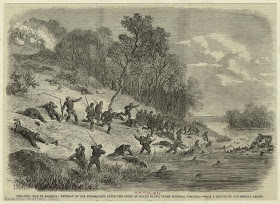STICKY WICKET
This phrase came from that crazy game of cricket that British people are always playing. Nobody much in the U.S. plays this game or even understands how to play it, unless they are from someplace like the U.K. or Australia or Pakistan or Sri Lanka. But a lot of Americans do know that the phrase sticky wicket can be used to describe a situation that is, well, sticky, or difficult.
Anyway, to get more literal about it, the surface that you play cricket on is called the "wicket." So if you are playing in a sheep pasture, for example, and it has rained, the field is all sticky with mud. This causes the ball to bounce in ways that you might not expect, which makes it hard to bat the ball. Or something like that. All this would make more sense if I knew how to play cricket.
A sticky wicket can also be called a sticky dog or a glue pot, but "sticky wicket" is more fun to say because it almost rhymes, so I think that is why people use this phrase more than the other two. Besides, I don't like to think about a "sticky dog" because a dog who gets all sticky will need to have a bath, and what fun is that?
SKEDADDLE
If you see a big, scary monster coming toward you, you should definitely skedaddle! At least that's my advice. Skedaddle is another word that's fun to say, and it's a word that got invented right here in America, during the Civil War. Maybe there were lots of soldiers who had to skedaddle during battle, and that's what made it a such a good wartime word. Then after the war, people just kept on finding reasons to skedaddle, so we are still using the word today.
Probably, skedaddle came from scaddle, which is British dialect that means "to run off in a fright." Scaddle is also a Middle English word for "wild," "timid," or "skittish."
ANTIGODLIN
I never heard this word before, and neither did Mom. It is used mostly in the south and west parts of the U.S., and it means the same thing as sigogglin (SY-gog-lin, sy-GOG-lin), which comes from the Appalachian region. Either of these words can be used to talk about something that is crooked or leaning or lopsided. Like for example, if you aren't a very good carpenter, and you build a doghouse in your back yard, and it looks like it's about to fall over, and your dog is afraid to even go in there, then that doghouse is antigodlin. Not only that, but it is on the skewgee, which is another useful word I never heard of before.
Actually, sigogglin is archaic now, but some people still say antigodlin or antigogglin. These words date back to about 1895 or 1900, and they might have come from the British dialect goggle, which means to shake or tremble. Then if you change goggle to godlin and put anti in front of it, you get a meaning of "against God" or something that is unnatural. But of course, nobody is totally sure if this is how the word got started or not.
DRESSED TO THE NINES
This phrase means that you are dressed up in really fancy clothes, but it's hard to know what the number nine has to do with getting dressed up. The same problem is involved with the phrase "the whole nine yards." Some people have said that it took nine yards of cloth to make the kind of suit you would wear when dressed "to the nines." Another theory is that "to the nines" came from "to thine eynes," which was an old-fashioned way of saying "to the eyes." So in other words, you are dressed up all the way to your eyeballs.
One man who wrote about this phrase, and who is named Gary Martin, thinks that "nine" in this phrase just means "a lot." Another idea is that nine is a very special number because it is the highest single digit, so it stands for the best or for perfection.
GONZO
This is a word that can be used to talk about anything that is really strange or bizzare or freaky. There is a gonzo style of journalism that was invented by a writer named Hunter S. Thompson, and in this type of writing, the reporter talks about the action while he is right in the middle of it. Part of what the writer says is true experience, and another part is fiction. An example of this is a book that Mr. Thompson wrote in 1971 called Fear and Loathing in Las Vegas.
A gonzo can also be a crazy person or a fool. It can be someone who is unconventional or who writes in the exaggerated style of gonzo journalism. Oh, and Gonzo is also a character on Sesame Street.
Probably this word came from the Italian word gonzo, which means a fool or a simpleton. Or it might be from the Spanish word ganso, which is a goose or a dullard.
Mom says she is going to start calling us dogs "gonzos" because it seems like a good word to describe us, but I don't know why she would say that.








No comments:
Post a Comment